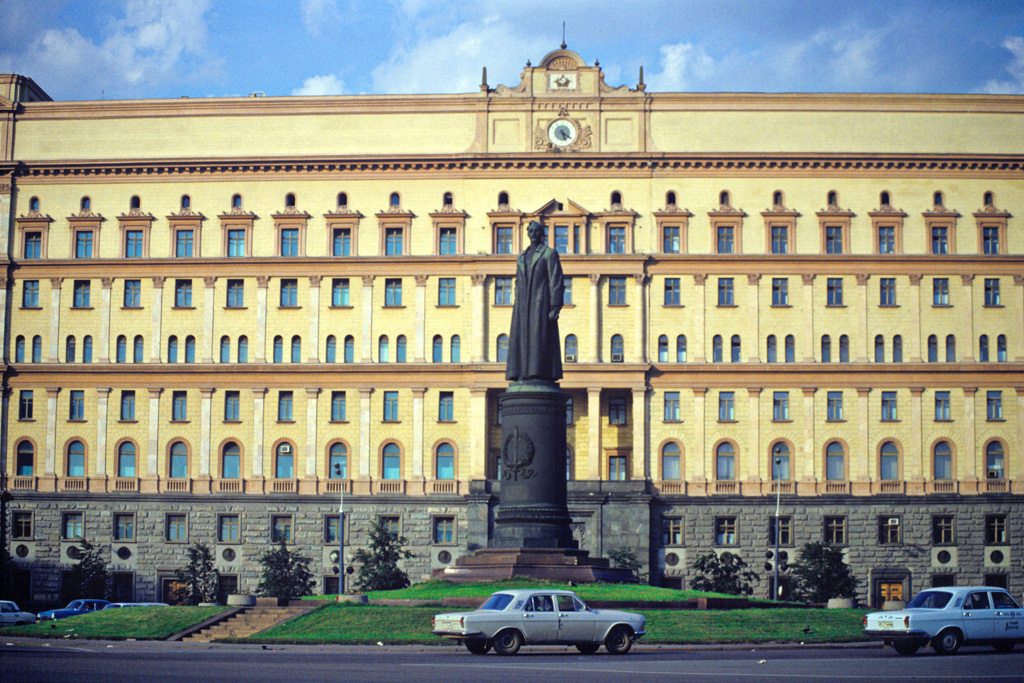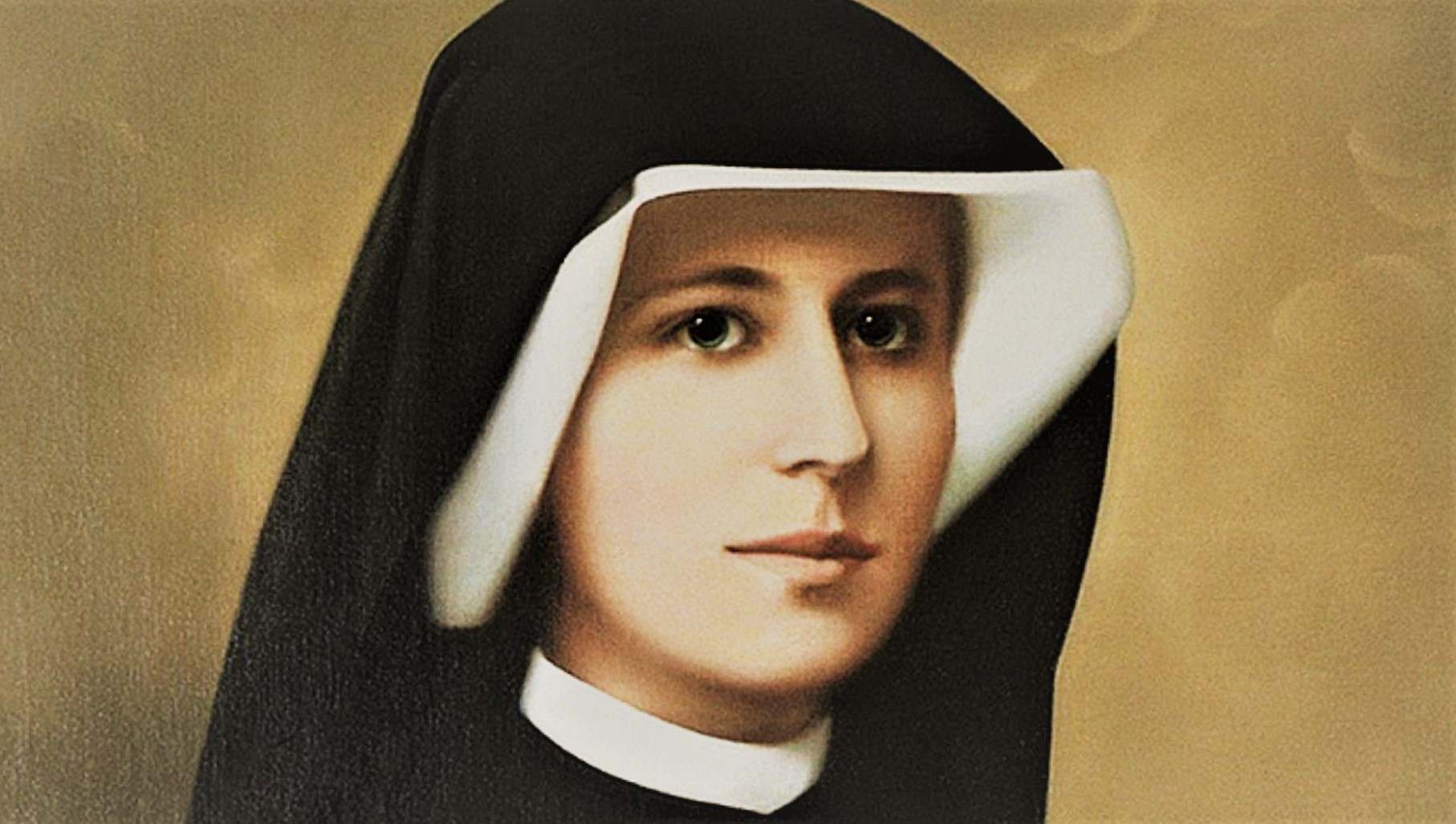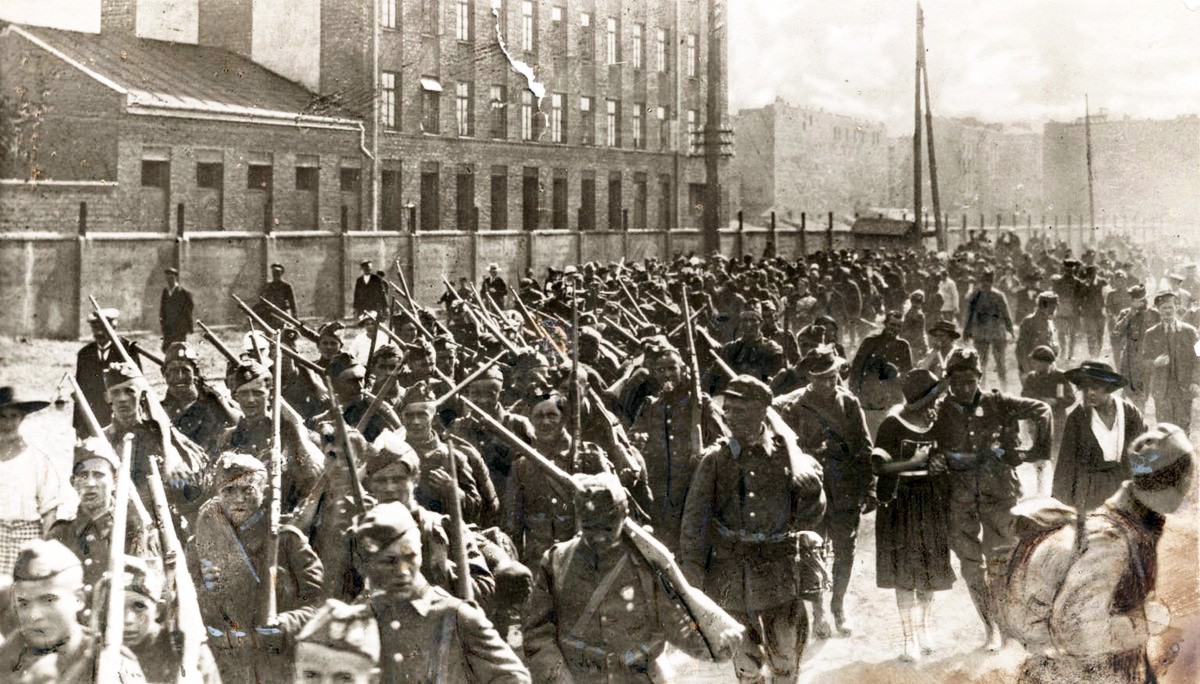General Mucha’s report of 23 August 1980 is the first known document of this status describing the KGB’s reaction to the events in Poland. The strikes are presented as a counter-revolution and it suggests that Poles should be given “brotherly help”.
by Andrzej Grajewski
The addressee of the report is the First Secretary of the Central Committee of the Communist Party of Ukraine Volodymyr Shcherbytsky, one of Leonid Brezhnev’s closest associates. He ruled Ukraine for nearly 20 years, fighting the so-called Ukrainian nationalism and the dissident movement. He fought Christian communities, especially the Greek Catholic Church, which was banned in Ukraine in 1946. In this power system, the KGB structure of Ukraine, headed by General Vitaly Fedorchuk, trusted by the chairman of the Committee, Yuri Andropov, played a fundamental role. After Andropov assumed the function of general secretary of the Central Committee of the Communist Party of the Soviet Union in 1982, Fedorchuk became the chairman of the KGB, leaving in Kiev Deputy Lieutenant General Stepan Mucha, the author of the report on the situation in Poland. He did not belong to the Cheka, but he was a party activist who, in 1973, was assigned to work in the security services. It is worth adding that the KGB of Ukraine submitted a detailed report on the situation in the country to the party leadership at least once a month. In extraordinary situations, additional materials were prepared and this concerns the published document, currently stored in the Separate State Archives of the Security Service of Ukraine in Kiev.
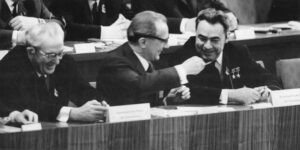
The report was prepared on the basis of information obtained both in Ukraine and Poland. Certainly, the KGB also had a number of other sources in Poland – mentioned by General Vitaly Pavlov, at that time the head of the KGB in Warsaw (“Narew” Group). General Mucha’s report is interesting precisely because it assesses the strikes not from the perspective of the Moscow headquarters, but from the perspective of Ukraine, a place more susceptible to what was happening in Poland. It is a political document intended to convince the authorities in Kiev of the immediate threat posed by strikes in Poland to the security of Soviet Ukraine. The role of John Paul II as a representative of the anti-communist part of Polish society is emphasized. The so-called statements by ordinary people suggest that actions should be taken to prevent the Polish crisis from reaching Ukraine.
General Mucha’s report is important for several reasons. It illustrates not so much knowledge about the situation in Poland, as it does the reactions of Ukrainian society to it. It is of great importance that the decisions on the extraordinary operational activity began at the Moscow headquarters of the KGB as early as 15 August 1980, i.e. only a day after the start of the strike at the Lenin Shipyard in Gdańsk. The strikers did not make any political demands at the time. They only demanded the employment of Anna Walentynowicz and Lech Wałęsa, the erection of a monument to the victims of December 1970, and an increase in wages and guarantees for the strikers.
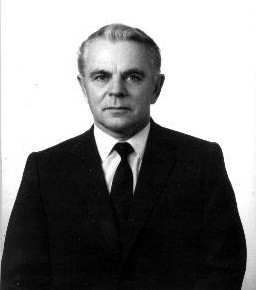
As it turns out, this was a sufficient signal for an emergency mobilization to be announced in Moscow. It is interesting to consider what was the scale of the network of spies that the KGB of Ukraine could then have had in Poland. The report mentions secret collaborators and operational contacts in July (39 people) and August 1980 (176 people). It soon expanded. Under the pretext of tourist traffic, successive groups of KGB officers and agents were transferred to Poland. At the same time, intensive operational work was underway among citizens of the People’s Republic of Poland residing in Ukraine. As part of perlustration, i.e. correspondence control, nearly 25,000 letters from four districts were controlled – Kiev, Lwów, Volhynia and Tarnopol. According to the KGB, these were regions where the population could be susceptible to slogans raised by striking workers in Poland. Experienced officers from Kiev were sent to the KGB district boards in the regions bordering Poland to help organize the operational work on the spot. The purpose of these actions was obvious: to prevent any contact between the opposition milieu in Poland and dissidents in Ukraine. These contacts were seen as the greatest danger to the stabilization of the situation in Soviet Ukraine. That is why they reacted so quickly in suggesting the Soviet authorities deal with the Polish revolt before it was too late.
The text was originally published on: https://twarzesolidarnosci.gosc.pl/.
Author: Andrzej Grajewski
Translation: Alicja Rose & Jessica Sirotin
***
23 August 1980
Memo on the situation in the Republic of [Ukraine] in connection with the events in Poland.
In connection with the events in Poland, as indicated by the State Security Committee (KGB) of the USSR, of 15 August this year, the KGB authorities of the Republic of [Ukraine] took measures to activate the Chekist-operative activities aimed at increasing the control of the operational situation at the right time exposing and putting an end to possible intentions of anti-Soviet elements, inspiring anti-social and hostile manifestations, and revealing situations that may lead to negative and other undesirable riots. For this purpose, certain operational sources have been instructed, trusted persons, and operational and technical means are used. In order to assist the KGB Office [of Ukraine], experienced employees of the Committee were assigned to various fields.
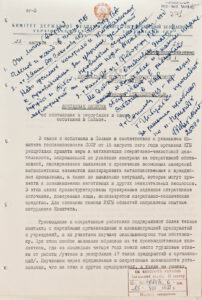
Managing and operational employees maintain closer contacts with party organizations and administration of enterprises and institutions, and with their participation they examine the situation arising there. At the same time, particular attention was paid to those production collectives where there were work refusals to groups of people in the last four years (17 such enterprises and organizations were included in the Republic of [Ukraine]). On the basis of the official and operational research, it was established that in these and other enterprises, and in markets and shops, and other places of mass concentration of the population, the situation is normal. The premises for the emergence of negative phenomena have not been revealed.
The information obtained in an efficient manner proves that working people correctly assess the situation that arose in the People’s Republic of Poland. Many of them express their indignation at the outbursts of anti-socialist elements and the stirring up of the West.
According to the opinion of the citizens of the Republic of [Ukraine], events in Poland are inspired from the outside by anti-socialist elements and by the reactionary part of Catholics in the People’s Republic of Poland, and are the result of the vital nationalist sentiments and the existence of private property among a significant part of the Polish population, errors in economic activity admitted by the country’s leadership and the flourishing of private sector economics.
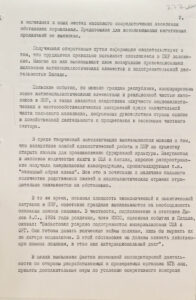
In the milieu of the intelligentsia, opinions are expressed that as a result of poor ideological work in the People’s Republic of Poland, channels for the penetration of bourgeois culture were in fact able to exist. Books are bought in mass in the USA and England, American film production promoting the so-called “Western way of life”, has also become widely popular. All this, combined with the existence of a large number of family contacts in capitalist countries, negatively affects the situation.
At the same time, understanding the complexity of the economic and political situation in the People’s Republic of Poland, Soviet citizens commented on the need to help Poles. In particular, the retired Lieutenant Colonel Lykov A.S., born in 1924, a member of the CPSU, when assessing the events in Poland, said:
“Strikes are zealously heated by the US and West German imperialists. They are ready to give Poles any loan they want in order to free them from the camp of socialism. In this situation, we should provide effective help to Poles, this is our internationalist duty.”
In order to discover the possible inspirational activity on the part of the people investigated and checked by the KGB organs, additional methods were undertaken to intensify their operational control. The information obtained shows that the majority is still waiting. At the same time, the opinion is expressed that the Polish government, with the help of the Soviet Union and other socialist countries, will “suppress strikes by any means until the troops are introduced.”
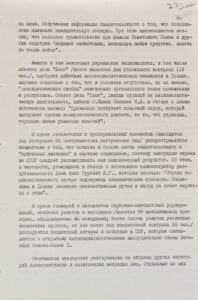
At the same time, some Ukrainian nationalists, including the defendants of the “BLOK” (“Блок”) case (in total 112 people were allocated for enhanced control), approve of the actions of anti-socialist elements in Poland, regretting the fact that in the circumstances of the lack of, in their opinion, “democratic freedoms”, it is not possible to organize such manifestations in the Republic of [Ukraine]. Defendant of the BLOK case, tried twice for nationalist activities, a resident of the city of Kiev, Semeniuk K.W. in an interview with our Source, he said: “The Polish nation, which stands against the communist dictate, behaves correctly, not like the Ukrainians, tolerating any humiliation of the authorities”.
In the milieu of Zionist and pro-Israel elements (under the control of 36 extremist-minded people) there is widespread faked opinion that the events in Poland seem to indicate “crisis phenomena” in the socialist system, and therefore the emigration of Jews from the USSR should be considered as a correct result. This, among other things, was claimed in an interview with the Source by the administrator of the Republican House of Cinema Guriewicz L.G., who said: “The countries of the Socialist Camp are subject to economic crises. Socialism in Poland was implemented by means of violence and the nation does not want to accept it.”
Among the leaders and activists of church-section formations, especially Greek Catholics and Catholics (there are 99 Catholic parishes, served by 46 priests; over a thousand Greek Catholics of various monastic orders, 58 of whom were subjected to operative control), there is an increased interest in the events in the Polish People’s Republic, which it is connected with the open anti-socialist speeches of the head of the Vatican, JOHN PAUL II.
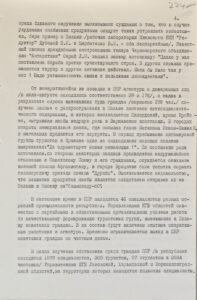
There are unhealthy reactions from other categories of Soviet anti-sympathizers and politically immature people. Individuals among them, among their close circle, express views that in the event of a deterioration in food supplies, strikes should also be organized, following the example of Poland (workers of the Laboratory of the Kiev Institute of Science and Research (NII) “Reduktor” Dubovoy I.I. and Shcherbatenko W.I. – both not party members). Known for his hostile attitude, the lathe operator of the Black Sea Union “Antarctica”, Sieryj L.M. declared to our Source, “Our fight against the existing system took a wrong direction. Terror and other active measures are used in other countries. If it were so here! Communication with Polish dissidents should be established.”
From the agents returning from Poland and from trusted people (39 people stayed in Poland in July and 176 in August) and as a result of interrogating citizens leaving for Poland (298 people were questioned), data was obtained on anti-Soviet leaflets distributed in Poland, in which Piłsudski is praised, The Home Army, which supposedly played a leading role in the Warsaw Uprising. Commemorative plaques where the head of the Vatican John Paul II stayed, were unveiled in the cities, his portraits are sold in shops. During the stay of a group of tourists from Żytomierz in Krakow, one of the approaching young Poles shouted: “Long live the new revolution!”.
According to information from a number of sources, some Poles have an unfriendly attitude towards the Soviet Union and its citizens, they condemn the military aid to Afghanistan, in the city of Wrocław there was an attempt to break the television broadcast on the arrival of the train “FRIENDSHIP” (“Дружба”). There is dissatisfaction among people that the shortages of food products are supposedly the result of sending them from Poland to Moscow for “OLYMPICS – 80”.
Currently, there are 46 specialists from various industries of the Republic of [Ukraine] in the People’s Republic of Poland. The boards of the KGB zones, together with party and social organizations, intensified work in the field of qualitative shaping of tourist groups of Soviet citizens leaving for Poland. Experienced operative employees and intelligence agents will join them. The amount of Soviet citizens traveling to the People’s Republic of Poland on private matters is temporarily limited.
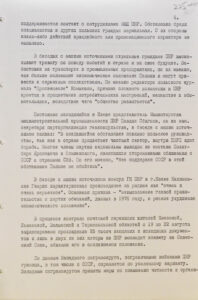
In order to investigate the situation among the citizens of the People’s Republic of Poland (the Republic of [Ukraine] hosts 1,879 specialists, 369 tourists, 97 students and 3,564 private entrepreneurs), the KGB Management Boards of the Lwów, Kharkiv and Voroshilovgrad Oblasts, where Polish specialists reside, maintain contacts with employees of the Ministry of the Interior of the Polish People’s Republic. The situation among specialists and other Polish citizens is normal. On their part, no hostile or provocative activities were found.
In conversations with our Sources, individual citizens of the People’s Republic of Poland express anxiety about the events in the country and about their future. Strikes in transport and in industrial enterprises, in their opinion, further complicate the economic situation of Poland and may lead to serious consequences. According to the editor of the Polish magazine “OŚWIECENIE” (“ПРОСВЕЩЕНИЕ”) Komykało [actually: Pomykało], the cause of the complex situation in the People’s Republic of Poland is hidden in the flourishing of consumerism, the bourgeoisie and “citizenship”, as a result of which “society is decaying”.
A representative of the Ministry of Mechanical Engineering of the People’s Republic of Poland, Pawlak Zbigniew, who was also the deputy secretary of the General Consulate, who was constantly in Kiev, said in an interview with our Source: “The Polish leadership is to blame for the situation that has arisen, because the private sector is flourishing in the country, there is a fight within the Polish United Workers’ Party. Many Party members are dissatisfied with the withdrawal from the Politburo of [Piotr] Jaroszewicz and [Stefan] Olszowski, who are supporters of rapprochement with the USSR and the countries of Comecon. In his opinion, “in this situation Poland cannot do without the support of the USSR”.
In an interview with our Source, the consul of the General Consulate of the People’s Republic of Poland in Kiev, Kalinowski Henryk, assessed the ongoing situation in the country as “very serious”. The main cause – “the leader of the Government and the Party failed the promises made in 1976 and the economic situation suddenly deteriorated.”
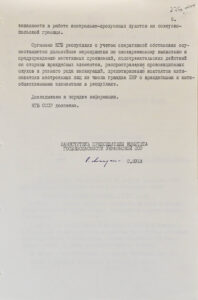
During the control of correspondence of residents of the Kiev, Lwów, Volyn and Tarnopol Oblasts, in the period from 19 to 22 August, around 25,000 incoming and outgoing documents was recorded, and only in two of them the authors from the Polish People’s Republic slander the Soviet Union, accusing it of the resulting situation.
According to the data of the Western Border District, the Border Troops of the Polish People’s Republic, including those from the USSR, protect the border in a reinforced way. On the Western border with Soviet-Polish side the level of work of checkpoints was increased.
The authorities of the KGB of the Republic of [Ukraine], taking into account the operational situation, carry out further undertakings according to the proper disclosure and prevention of negative, inflammatory actions, from hostile elements, spreading provocative rumors and various kinds of innuendo, preventing contacts of people from the group of citizens of the People’s Republic of Poland, with hostile and anti-social elements in the Republic of [Ukraine].
We present in the information mode.
The KGB of the USSR reported.
Deputy-chairman
State Security Committee
Ukrainian SSR [signature]
S. Mucha
Translation: Alicja Rose & Jessica Sirotin

